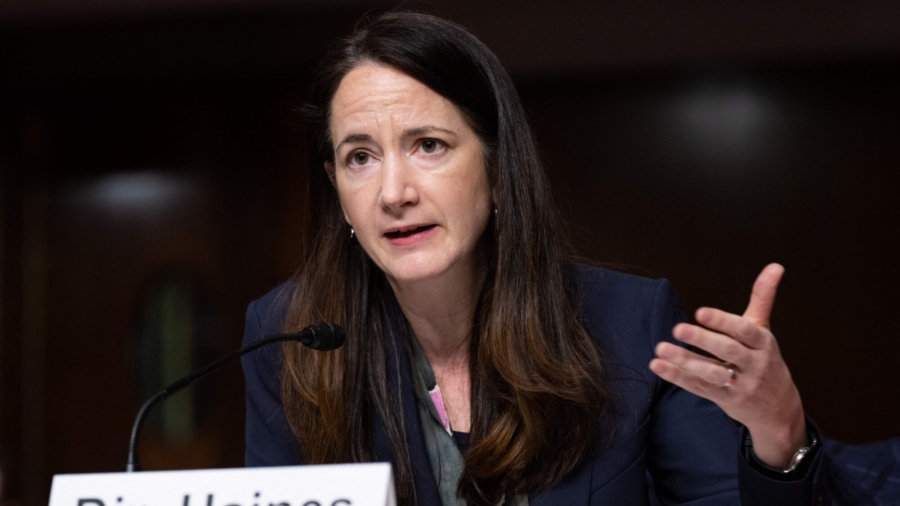House Judiciary Committee Chairman Jim Jordan (R-Ohio) filed a subpoena with Director of National Intelligence (DNI) Avril Haines on Thursday, demanding she turn over records of intelligence contacts with social media companies and technology platforms.
Mr. Jordan initially began seeking a range of records of intelligence community contacts with major technology companies last April, as part of the Judiciary Committee’s work through the Subcommittee on the Weaponization of the Federal Government. The Ohio Republican said he initially reached out to the DNI—a cabinet-level official overseeing the 17 U.S. intelligence agencies—on April 18, asking that she voluntarily divulge any instances of intelligence community members discussing and directly contacting private social media companies about their content moderation efforts.
In a Thursday letter to Ms. Haines accompanying his subpoena, Mr. Jordan said he followed up with the Office of the DNI (ODNI) numerous times after initially reaching out in April, but it wasn’t until August that ODNI personnel responded to Committee staff. Even after the ODNI’s initial response, Mr. Jordan said additional correspondence throughout September, October, November, and December had not yielded a single responsive document. He said the first actual formal response from the ODNI came on Monday, Jan. 8, but that response also did not include any of the requested documents.
Mr. Jordan said he would now pursue a subpoena to legally compel production of the documents he had been seeking, in light of ODNI’s “woefully inadequate voluntary compliance.”
The subpoena, which was reviewed by NTD News, orders Ms. Haines to turn over all documents and communications between ODNI employees and individuals the ODNI has consulted with discussing “misinformation,” “disinformation,” and “malinformation” and discussions of content moderation policies. The subpoena also calls for Ms. Haines to appear before the House Judiciary Committee on Feb. 9 for a deposition.
NTD News reached out to ODNI for comment on the alleged timeline of requests for voluntary document productions and about how the intelligence community office will respond now to a subpoena. ODNI did not respond by press time.
U.S. government efforts to influence the content seen on social media has been a major point of focus for House Republicans, with concerns that government actors may pressure private entities to shape public discourse.
“The investigative work performed by the Committee and its Select Subcommittee on the Weaponization of the Federal Government, along with other publicly available information, have revealed how the federal government has pressured and colluded with Big Tech and other intermediaries to censor certain viewpoints on social media in ways that undermine First Amendment principles,” Mr. Jordan’s Thursday letter reads.
“The First Amendment prohibits government officials from imposing viewpoint-based restrictions on speech,” the letter continues. “State action doctrine prohibits government officials from circumventing constitutional strictures by using private actors—whether through coercion, encouragement, entwinement, or joint participation—to accomplish what the government cannot directly.”
After billionaire entrepreneur Elon Musk bought out Twitter in late 2022, several journalists were granted access to internal company documents. Among these internal documents—which were published in a series of reports dubbed the “Twitter Files”—were records revealing FBI and Department of Homeland Security officials flagged content on the social media platform for review.
The “Twitter Files” reporting also detailed how FBI employees gave briefings to Twitter, warning about a potential Russian “hack-and-leak” operation ahead of the 2020 election. These communications came about in the weeks leading up to the New York Post’s reporting about a laptop then-candidate Joe Biden’s son Hunter Biden had allegedly abandoned at a Delaware computer repair shop. While the files did not show a direct FBI call for Twitter to suppress the Biden laptop reporting on the platform, the agency had access to the laptop’s materials in the months leading up to the New York Post’s reporting as it sought to brief the platform about alleged Russian disinformation efforts. The files also showed that as the Biden laptop reporting came out in October of 2020, James Baker—an attorney for Twitter at the time who’d previously worked for the FBI—urged the social media platform to view the Biden laptop reporting as hacked information and block it from appearing on the site.
In an ongoing federal court case, the Republican attorneys general for Missouri and Louisiana alleged officials within the Biden White House have exerted pressure to have certain social media users and posts censored. The lawsuit included allegations of direct requests for censorship from the White House, such as Deputy Assistant to the President and Director of Digital Strategy Rob Flaherty reaching out around January of 2021 about a post by Robert F. Kennedy discussing COVID-19 vaccines.
“Hey folks-Wanted to flag the below tweet and am wondering if we can get moving on the process of having it removed ASAP,” Mr. Flaherty wrote.
In another allegation raised by the lawsuit, Mr. Flaherty reached out to Twitter about a parody social media account of one of the Biden family members, writing “Cannot stress the degree to which this needs to be resolved immediately,” and, “Please remove this account immediately,” prompting the account’s suspension 45 minutes later.
A U.S. District Court in Louisiana had issued an injunction in July, blocking the Biden administration from contacting social media platforms about their content moderation practices. A federal appeals court narrowed that injunction in September. The U.S. Supreme Court subsequently lifted more restrictions from the injunction in October while the case proceeds.

